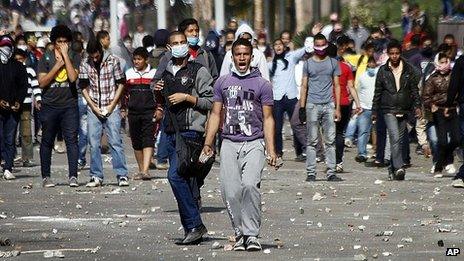Egypt divisions likely to deepen over draft constitution
- Published

Egypt's new draft constitution is likely to deepen the current division and confrontation in Egypt. Though President Mohammed Morsi may hope it can eventually show a way out of the crisis.
It was rushed through by an Islamist dominated assembly after a marathon 16-hour session. The aim was clearly to pre-empt any legal challenge by the courts as they confront Mr Morsi over his controversial new powers.
Most liberals boycotted the session. One of their leaders, Nobel Peace Prize winner Mohamed ElBaradei, said the new document would be consigned to the "garbage can of history". But the draft constitution has been strongly defended by the Muslim Brotherhood.
On the most controversial issue, the draft constitution says that "the principles of Islamic law" should be the guiding principle for Egyptian law. That is the same wording as in the old, Mubarak-era, constitution.
Protester: "In this latest constitutional declaration (Morsi) is setting himself up as a dictator"
But liberals are worried about a number of other articles they say could curtail freedom and lean the country towards Islamism.
Fears for equality
The document says that the al-Azhar institution, the leading authority in Sunni Islam, should be consulted on any matters related to Islamic law. Many fear that this would give the clerics too great a say in law-making.
Another article says the state will protect the "true nature of the Egyptian family... and promote its morals and values".
Again, liberals fear that gives scope for Islamists to impose their views on popular culture. There is further unease about a clause that gives the state a duty to support the arts, science and literature, and to work to implement them in a way that serves society.
There is no article specifically establishing equality between men and women. The draft does say that a woman must balance her duties toward family and outside work.
Another article bans insults to or defamation of the Prophet Muhammad and other prophets, raising further concerns about freedom of expression.
The draft now goes to President Morsi who may call a referendum as early as the middle of December.
Opponents will have to decide whether or not to boycott the referendum.
Judging by the results of the last parliamentary election, Islamists are possibly in a minority in Egypt, certainly not an overwhelming majority. However, they are much better organised than the liberals, and may be better at getting their supporters to the polls.
Another question is whether the judges will take part in supervising a referendum, as stipulated in the law. The government will be hoping that they have enough supporters in the judiciary to enable a referendum to go ahead, even if many of the judges do refuse to take part.
Another of the liberal leaders, former presidential candidate Hamdin Sabbahi, accused Mr Morsi of "pushing Egypt to more division and confrontation".
"The people should not be made to choose between a dictatorial declaration or a constitution that doesn't represent all the people," he said in a television interview.
The move has also been condemned by Human Rights Watch (HRW).
"The decision of constituent assembly leaders to move a flawed and contradictory draft to a vote is not the right way to guarantee fundamental rights or to promote respect for the rule of law," said Joe Stork, deputy Middle East and North Africa director at HRW.
"Rushing through a draft while serious concerns about key rights and protections remain unaddressed will create huge problems down the road that won't be easy to fix."
But Essam al-Erian, a leading figure in the Muslim Brotherhood, defended the draft constitution.
"This constitution represents the diversity of the Egyptian people. All Egyptians, male and female, will find themselves in this constitution," he insisted.
President Morsi, speaking in a TV interview late on Thursday night, said he would give up his sweeping new powers, which have so divided the country, once a popular vote on the constitution had been held.
In the meantime, more demonstrations are planned.
Opposition supporters are already on the streets and the Muslim Brotherhood has called its supporters out on Saturday.
In a small gesture of compromise, the Brotherhood decided not to march on Tahrir Square, where the liberals are camped out. Instead they plan to hold their main rally nearby, outside Cairo University.
But the coming days and weeks are likely to see more demonstrations, and possibly confrontations, in a country deeply divided over its future.